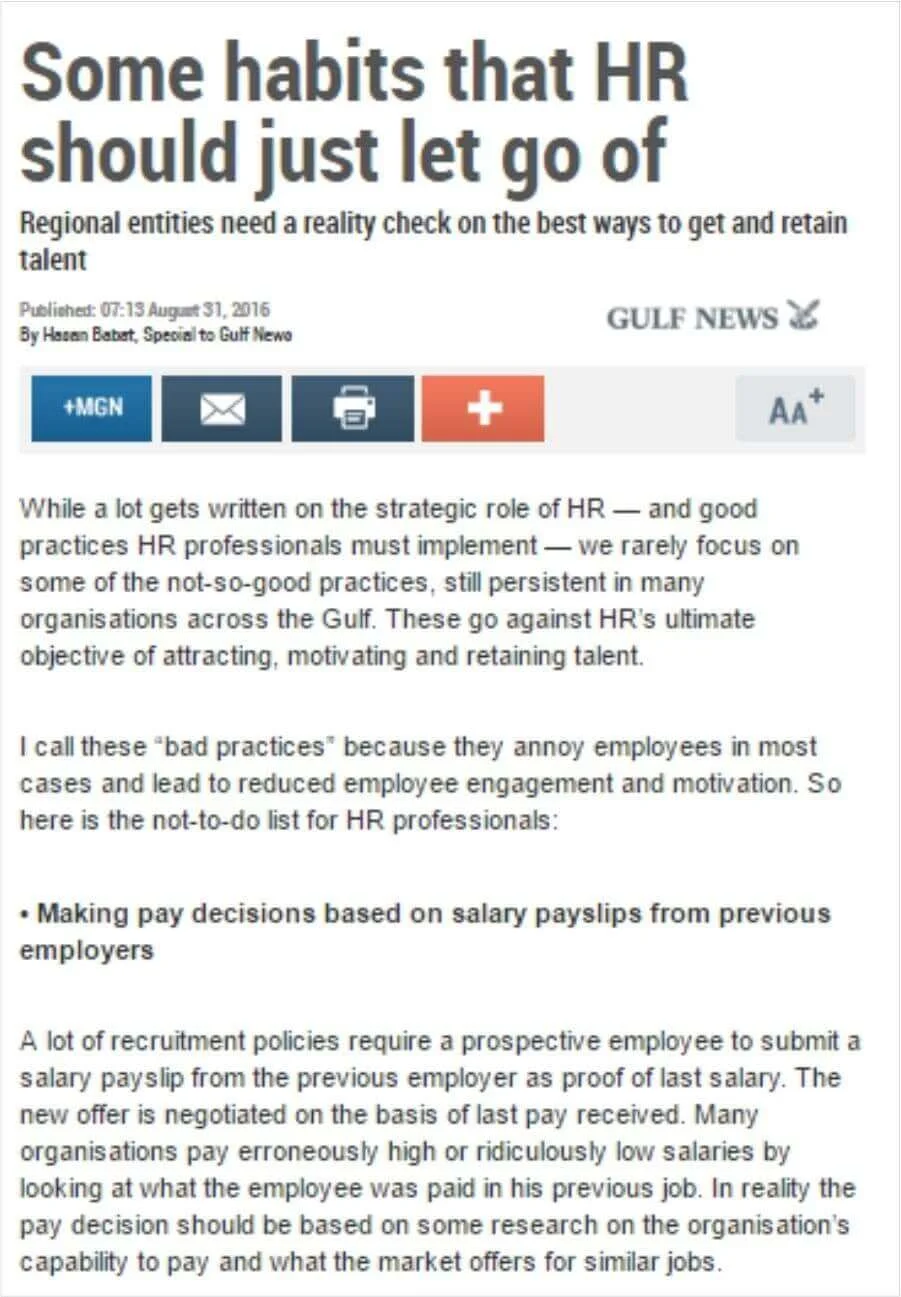
Usually a lot gets written on the strategic role of HR, and the good and best practices HR professionals must implement in the workplace. Yet we rarely hear on some of the not so good practices still persistent in many organizations across the GCC. These practices contribute against HR’s ultimate objective of attracting, motivating and retaining talent.
We call these “bad practices” because they agitate employees and are a major cause of reduced employee engagement and motivation in the workplace. In some cases these practices even lead to a higher attrition rate and make the organization less attractive for prospective employees to work. If you are an HR professional, here is a not-to-do list for you.
A lot of recruitment policies require a prospective employee to submit a salary payslip from the previous employer as proof of last salary. The new offer is negotiated on the basis of last pay received. Many organizations pay erroneously high or ridiculously low salaries by looking at what the employee was paid in his previous job. In reality the pay decision should be based on some research on the organization’s capability to pay and what the market offers for similar jobs.
Employees in many organizations operate on day-to-day instructions from their managers, without clearly understanding their job roles, and how their job contributes to the overall purpose of the organization. Some organizations still operate without clearly defined job descriptions for employees. These organizations experience lost productivity, conflicts, unequal distribution of workload and duplication of responsibilities. In most cases employees feel discontented and exploited as they do not know what are “reasonable and fair work instructions” from their managers.
This one would top the list of bad practices. An employee is normally eligible for a compassionate/bereavement leave on the death of a family member. Some companies still ask employees to provide proof of death of a closed relative like father, mother, children and siblings. At times, HR practitioners become so process oriented that they don’t practice empathy which is a key in building employees trust towards the organization.
Many organizations say irresponsible use of internet and social media at work can deter employee productivity. Do these organizations hire employees who are irresponsible? We must understand that demographics have changed considerably in the workplace. The millennials employed in significant numbers in many organizations are super tech savvy. They feel the need to be connected all the time and even learn most skills online. Organizations should balance their needs more effectively.
Several factors have shaped stark differences in pay & benefits based on employee’s nationality. These include supply and demand of workers from a particular region, the quality and quantity of supply, gaps in existing legislations to promote equality etc. It is a widespread reality which HR must address through good practice.
Performance management aims to reward good performance and improve poor performance. Many organizations do not have a link between performance and rewards. Paying fat bonuses and increments may not be viable under difficult market conditions, but some form of reward and recognition is required to motivate employees to go the extra mile. Rewards do not necessarily have to be monetary even non-monetary rewards like recognition and spot awards have proved to increase employee motivation. A clearly defined reward policy is needed at the end of every performance cycle.
A lot of organizations turn the appraisal process into a mere paper filling exercise. For a performance management system to be successful, the manager and employee must sit and agree relevant objectives for the employee at the beginning of the year and the employee should be appraised on the agreed objectives. Without clearly written objectives, employees shoot in the dark and waste energy on unproductive goals and the appraisal process becomes meaningless.
Will I be fired this month or the next? Markets may be difficult globally and organizations need to restructure at times. HR and managers must collaborate and build effective communication to ensure there is no unnecessary attrition of vital talent. Especially the high-potential talent an organization wishes to retain. A lack of proper communication leads to high-potential employees diverting their energy to look outside for stability.
Should an employee be granted paid sick leave during probation? While the labour laws in the region rightly allow minimum benchmark guidelines for the wider base of employers, they don’t restrict employers from offering better employee entitlements. So if an authorised medical practitioner can certify illness, why not?
Many organizations do not have written policies, or in many cases use outdated HR policies. Clearly defined policies not only boost employee morale but save time and effort for HR, which otherwise gets wasted on resolving queries and issues.
This is surely illegal and a reducing practice now, but a clear no-to-do for an HR practitioner.
Most candidates in the region normally do not know what happens after they apply for a job or after they attend an interview and helplessly keep following up with HR. An automated acknowledgement to job applicants explaining them the next steps or a generic feedback to unsuccessful candidates helps in building a positive employer reputation besides being naturally expected by someone who needs a job.
This may not be a comprehensive list, but avoiding them will help HR professionals pave the way for good HR practices
 View on Gulf News
View on Gulf News